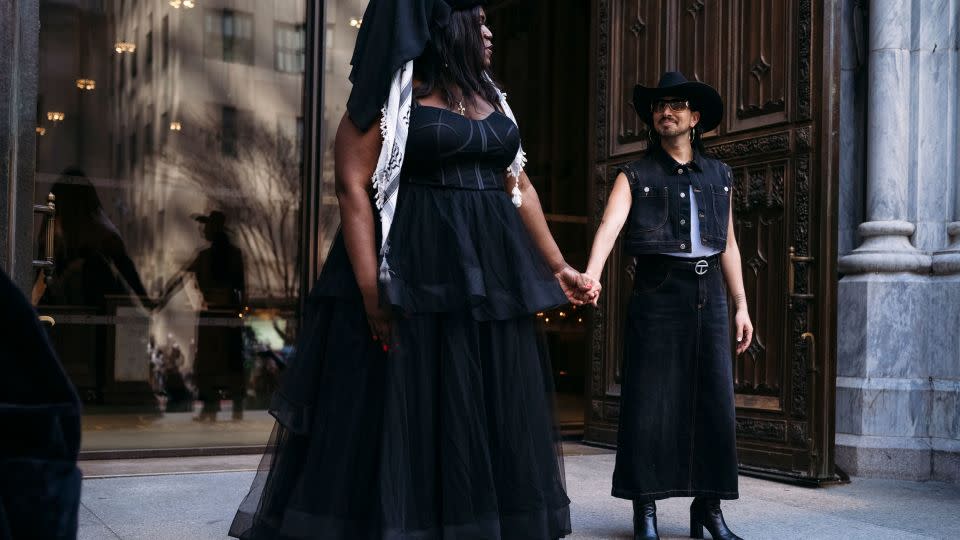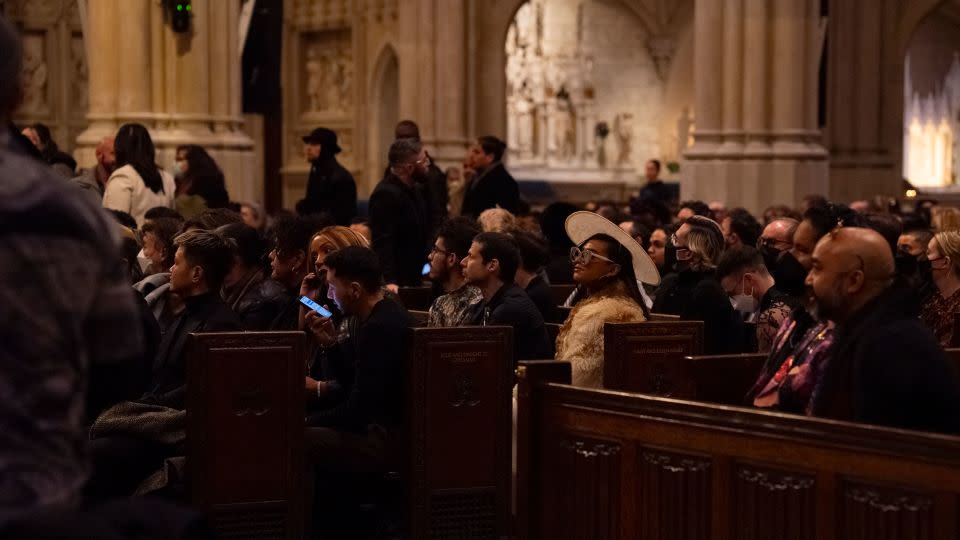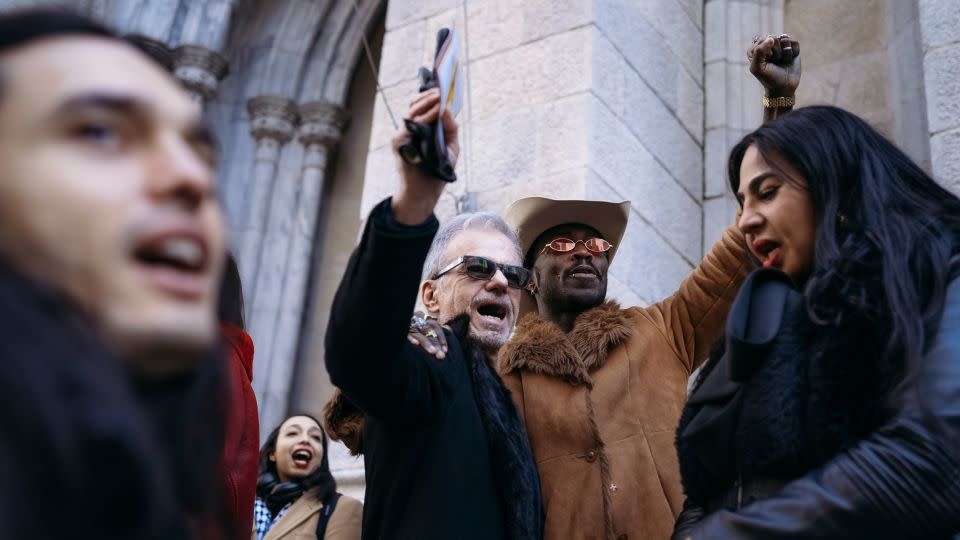Trans icon Cecilia Gentili is honored at a famous cathedral
On a chilly Thursday morning, hundreds of people packed the pews of St. Patrick’s Cathedral in New York to pay their respects to a woman venerated as a saint.
The woman being honored in this storied place of worship was activist Cecilia Gentili: an icon in New York’s trans community, a former sex worker and an outspoken atheist.
“This whore. This great whore,” trans rights advocate Liaam Winslet declared in a eulogy in Spanish to rapturous applause and a standing ovation. “Saint Cecilia. Mother of all whores.”
Gentili, who died on February 6 at 52, is believed to be the first trans woman to have a funeral in St. Patrick’s Cathedral, her funeral organizers said. The cavernous institution in Midtown Manhattan has held memorial services for such luminaries as Robert F. Kennedy, Babe Ruth and Andy Warhol.
It was a historic moment for the city’s LGBTQ community, which hasn’t always been embraced in these hallowed halls. In the late ‘80s, St. Patrick’s Cathedral was the site of a massive protest over the cardinal’s stance on the AIDS crisis and gay rights.


Despite its contentious history, funeral organizers said they wanted to honor Gentili — who grew up attending Catholic services — in a space befitting her legacy. They added that the cathedral wasn’t aware that Gentili was trans until shortly before the service (CNN has reached out to the Archdiocese of New York for comment).
But Gentili’s February 15 funeral went ahead. Chosen family members spoke from the lectern in glittering purple sequins, denim vests and Black Western hats. A friend prayed for God to protect trans people with housing and gender-affirming health care. For many in the city’s LGBTQ community, it was something of a reclamation.
“To have St. Patrick’s Cathedral full of trans and queer folks, sex workers, immigrants, Black and brown folks, folks in solidarity with Palestinians — a crowd roaring her name — cements the sainthood of the legacy she left behind,” Oscar Diaz, who helped organize the funeral and called Gentili mother, told CNN.

She fought for trans rights through art and activism
Gentili was born in 1972 in the small town of Gálvez, Argentina.
She said in interviews that she always knew that she was a girl, but that she had no models for being trans growing up — she often told a story about feeling so alien as a child that she believed she was an extraterrestrial. She was also a victim of childhood sexual abuse, which she grappled with in her 2022 epistolary memoir “Faltas: Letters to Everyone in My Hometown Who Isn’t My Rapist.”
In the early 2000’s, Gentili came to the US as an undocumented immigrant and struggled for years with homelessness and substance abuse while working in the sex trade. Eventually, she was granted asylum and began a career of advocating for LGBTQ+ communities.
Gentili didn’t let her traumas define her, finding humor and joy in the darkest of situations. In stage performances such as “Red Ink” and “The Knife Cuts Both Ways,” she shared the realities of trans life and her complicated relationship with religion with an infusion of comedy and wit. She also guest-starred in the FX series “Pose,” which spotlighted New York’s underground ballroom scene.

In 2019, Gentili founded the advocacy organization Trans Equity Consulting after years of working on HIV/AIDS care at GHMC (formerly Gay Men’s Health Crisis) and trans health issues at Apicha Community Health Center. She was instrumental to the passage of a 2019 New York state law that recognized gender identity as a protected category. A former sex worker who faced harassment and abuse at the hands of law enforcement, she advocated for the decriminalization of sex work and fought to repeal the state’s so-called “Walking While Trans” ban.
Gentili was also one of the lead plaintiffs in a lawsuit challenging the Trump administration’s attempt to roll back nondiscrimination protections for trans people in health care.
Her outspokenness came as trans people are under attack across the country. In recent years, conservatives have sought to ban trans athletes from participating in women’s and girls’ sports, prohibit gender-affirming care for minors, restrict drag shows and remove books that deal with gender identity from school libraries.

“A lot of people say that we’re fighting for a seat at the table but she was a really great example of what it meant to build your own table when you’re refused a seat,” Scout Silverstein, who called Gentili mother, said.
‘Cecilia ministered to all’
Save for Easter Sunday, St. Patrick’s Cathedral doesn’t typically see a turnout as big as the one gathered to remember Gentili, Rev. Edward Dougherty said with a chuckle at the service.
It was a testament to her immense impact.
At her funeral, Gentili was remembered as someone who stood fiercely and unapologetically with some of the most marginalized people in society: trans women of color, sex workers, the undocumented and the incarcerated.

“Y’all may have heard the story that Jesus ministered to all,” Ceyenne Doroshow, a sister to Gentili and a formative figure in the Black Trans Lives Matter movement, said in a eulogy. “Cecilia ministered to all.”
Though members of New York’s trans community saw her as a mother, sister, leader or friend, her influence reverberated beyond. A day before the funeral, Rep. Alexandria Ocasio-Cortez memorialized her on the US House floor.
Silverstein said they had friends from Denver and Washington, DC in attendance. Others showed up to honor her contributions to various social justice movements, even if they weren’t personally close.
“She’s not just a New York City icon,” Silverstein added. “She is like a Marsha P. Johnson and a Sylvia Rivera.”
Through her advocacy and storytelling, Gentili provided others the support that she lacked earlier in life. She guided countless young people through hormone therapy and gender transitions while working at LGBTQ+ health clinics, some of whom became her chosen family.


Rio Sofia, who sported a feathery red dress with hundred dollar bills as sleeves, was one of her many children.
Sofia recalled meeting Gentili a decade ago in the waiting room of the Apicha Community Health Center. She said Gentili recognized that she was trans even before she did, offering critical support over the years. As the two grew closer, they became family. Gentili even walked her down the aisle at her wedding.
“People who might not understand trans family structures might see her as a motherlike figure,” Sofia said. “She was a mother, period. Mothering is not a metaphor for us.”
Her funeral was a tribute to her spirit
For all of her policy achievements and artistic pursuits, Gentili was more than her activism.
Actually, Silverstein said, she would have wanted to be remembered as “hot.”
“I think she’d be pissed if she saw obituaries and press that was describing all of her work and not including that she was super hot,” they said. “She was mother. She was a MILF.”
Ever the glamazon, Gentili took pride in her age-defying appearance. When Doroshow announced at the funeral that Gentili was born in 1972, the audience reacted in mock horror. (“Imagine the shock and surprise!” Doroshow replied cheekily.)


In honor of their friend and beloved leader, funeral attendees were instructed to serve their best looks. And so they did, showing up in ensembles of lacy veils, fishnet stockings and fur coats. They came carrying bouquets of red roses because it was her favorite color. Still, her friend Yves Mathieu East mentioned after the funeral that Gentili would have wanted to see more red.
Gentili may not have been a believer, but she likely would have delighted in the spectacle at St. Patrick’s Cathedral. At several points during the funeral, St. Patrick’s Cathedral echoed with chants of Gentili’s name.
“Cecilia! Cecilia! Cecilia!”
For Gentili to be front and center at an institution that hasn’t historically welcomed her, for her community to fill its halls and take up space in her name, was radical. But those closest to her wouldn’t have dreamed of anything less for Gentili’s final sendoff.
As she said in her one-woman show “Red Ink,” “I don’t believe in God, but God wanted me to be always, always, the star of the show.”

For more CNN news and newsletters create an account at CNN.com

